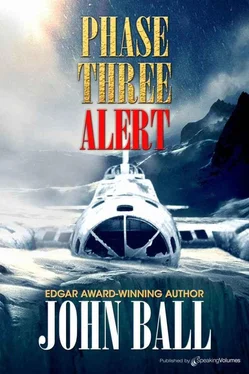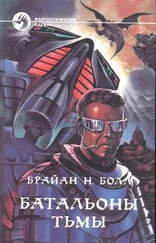“Yes, sir, it has.”
“Good. I understand that the Otter is bringing a respirator that’s urgently needed. Find out from Captain Markley how big it is and have enough people there to handle it.”
“That’s been done, sir. Everything is set up to be in position forty-five minutes before the final ETA. I’ll be there myself to see that there aren’t any hitches.”
“Very good,” the colonel said. “Notify me immediately of any changes.”
“Yes, sir.”
Base Operations called to advise that Jolly Two had returned from Kanak with the parents and family of Bebiane Jeremiassen. It had been another rough trip, but not as bad as last time. The Eskimos had accepted the helicopters as part of their cultural environment; with stoic immobility the Jeremiassens had ridden in it toward the military hospital where their daughter lay. Thorlund was there to meet them, and he surprised them with the news that the girl was still alive — they had known about the consequences of rabies long before the air base had been built. When he explained that special people and equipment were en route from Godthaab solely to help her, they were stunned and grateful. They had not dared to hope for so much. Dr. Pedersen, who spoke their language fluently, had prepared them for the worst.
In Operations, word came in from Sondrestrom: despite repeated calls on several frequencies, they had not been able to raise the Otter. Undoubtedly, due to weather conditions the plane had been flying close to the surface of the ice cap, consequently there was no radar contact. Sondrestrom further advised that weather there was in phase condition and the field had been closed to anything but emergency landings. Blind broadcasts with that information had been put out to the Otter on all frequencies that the aircraft would be likely to be guarding. It had been assumed that the pilot had experienced transmitter failure, something that usually managed to happen at the most inconvenient times possible.
Thule went on-the-air directly. There had been no contact with the Otter, but that had not been a cause of concern. A number of calls went out on all likely frequencies, including 121.5, which is internationally reserved for emergency use. There was no response whatever. When it had been determined that two-way communications could not be established, a special blind weather broadcast was put out and repeated several times. The pilot was also asked to climb to a higher altitude, if possible, so that the 360-degree radar at J site could obtain a fix.
The door to the operations room opened and Colonel Kleckner came in. “What have you got?” he asked. Before the NCOIC could answer him, the PA system called for attention. Phase One was declared. The colonel picked up a phone and called Weather. Because he was the colonel, he got through immediately. “Exactly how bad is it?” he asked.
“Definitely Phase Two is coming, sir. Right now we’re damn glad that the Jolly is back in the barn. It looks bad for the Otter.”
“Any chance of it letting up in the next hour or so?”
“Sir, I doubt it very much. This whole system came up right out of nowhere and we still don’t know its extent. Sondrestrom is socked in; Alert is still open.”
“I don’t think the Otter could make it that far,” the colonel said. “What’s the latest map that you have?”
“Fifteen minutes old.”
“I’m coming in to see it.”
In the weather section the colonel studied the fresh weather map and then all of the available sequences. When he had done so, he was in full agreement with the forecasting staff. He went back into the operations section, called his headquarters, and declared an emergency alert. All personnel and equipment with rescue assignments or capability were ordered on standby.
The word was immediately passed to J Site; the radar center responded by putting its own Trackmasters and crews on alert status. The huge antenna that normally patrolled the hundreds of objects known to be in space, both artificial satellites and space debris, abandoned that vital duty and, dropping low, sent its powerful beam out over the ice cap. It swept across and back over a considerable arc, but no target return showed on any of the scopes.
The terminal was comfortably filled by the men who had been summoned to transport the medical personnel and the respirator to the hospital. Lieutenant Kane kept them there, awaiting some word that would allow him to make an intelligent decision. The ETA that was posted on the board crept closer. When it passed, the NCO on duty erased it and carefully printed in the word OPEN.
The minutes passed and slowly chained themselves into a half hour. The radio calls continued without response. Weather data was put out blind, together with all other available information. By now transmitter failure was almost a certainty, but it was entirely possible that the Twin Otter could still receive. At literally any moment the missing aircraft could appear over the edge of the ice cap. The field lights were turned on at maximum intensity.
At fifty minutes past the estimated arrival time, Colonel Kleckner spoke to the operations NCOIC. “Raise Sondrestrom. Get the fuel load on the Otter, the cruising speed, and the rate of consumption if they have it.”
“Yes, sir.”
Sondrestrom had most of the figures readily available; another Otter pilot was keeping a news watch on their operations and he, of course, was fully familiar with the aircraft. He reported that the pilot had left with full tanks and that he had already computed the maximum duration time in the air: at 1827 hours the Twin Otter would be out of fuel.
The radio calls continued. J Site reported that still no radar echo had been received. No one thought of dinner. It was very quiet until the phone broke the silence. Dr. Markley was on the line. He was extremely anxious; he had his patient immobilized, and she could not stay alive without the Bennett respirator for many more hours.
The colonel checked once more with Weather. There were no new data to report.
Many times before in his career the colonel had stood by, awaiting an incoming aircraft that was long overdue. In combat situations that happened all the time, and to a degree he was hardened to it. This was a different matter, and fighting men who took their chances by choice were not involved. He walked up and down, thinking his own thoughts, until someone put a cup of coffee into his hand. He drank it without being aware of what he was doing.
At 1800 hours the quiet was like a thick, inert gas that filled the room. The transportation people were still standing by; Lieutenant Kane remained in the chair where he had been waiting for the past two hours. A new crew came on duty at the operations desk, but the men who had been relieved chose to remain. The colonel picked up the phone to communicate with J Site and put it down again; he knew perfectly well that they would call within seconds if they had anything at all.
The PA system came on with the announcement that Phase Two was in effect. The colonel was notified that all persons on the base had been accounted for. Two Trackmasters were standing by the Det. 4 hangar for possible airlift onto the ice cap.
Silently, the colonel watched the clock, as did every man in the crowded terminal building; 1827 hours occurred when the sweep second hand reached the top of the dial and continued inexorably onward. It took no notice whatever — its function was to measure off the astronomical units called minutes and it did so tirelessly and without emotion.
The colonel knew that it was up to him to say what everyone knew. He gave it another five minutes and then made the announcement. “It can only be one thing,” he said into the heavy silence. “Somewhere they’re down on the ice cap.”
Читать дальше












